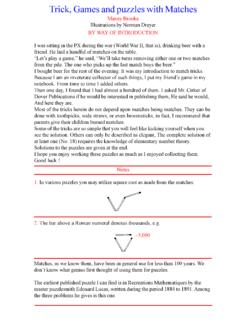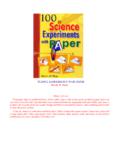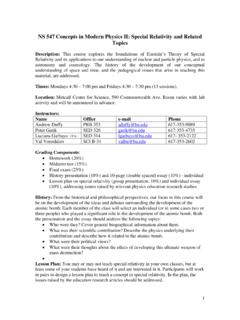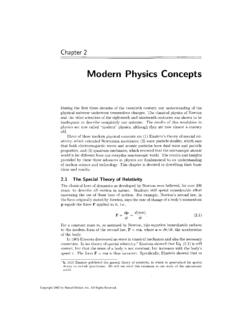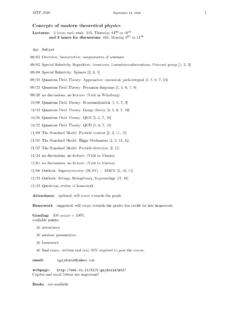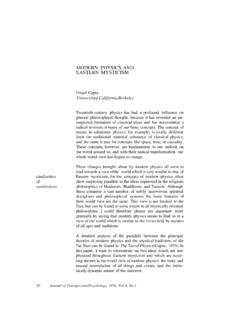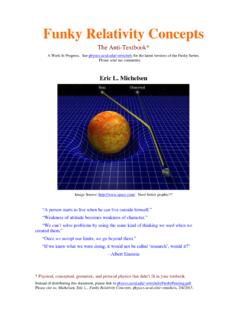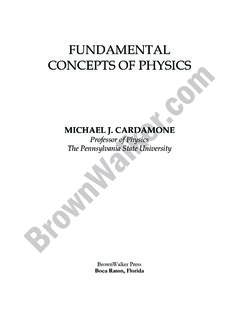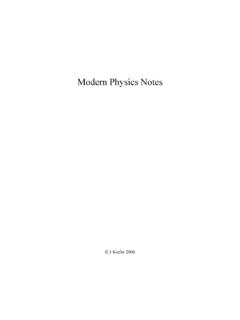Transcription of UNDERSTANDING PHYSICS - Arvind Gupta
1 UNDERSTANDING PHYSICS Part 1 MOTION, SOUND & HEAT Isaac Asimov Motion, Sound, and Heat From the ancient Greeks through the Age of Newton, the problems of motion, sound, and heat preoccupied the scientific imagination. These centuries gave birth to the basic concepts from which modern PHYSICS has evolved. In this first volume of his celebrated UNDERSTANDING PHYSICS , Isaac Asimov deals with this fascinating, momentous stage of scientific development with an authority and clarity that add further lustre to an eminent reputation. Demanding the minimum of specialised knowledge from his audience, he has produced a work that is the perfect supplement to the student s formal textbook, as well se offering invaluable illumination to the general reader.
2 ABOUT THE AUTHOR: ISAAC ASIMOV is generally regarded as one of this country's leading writers of science and science fiction. He obtained his in chemistry from Columbia University and was Associate Professor of Bio-chemistry at Boston University School of Medicine. He is the author of over two hundred books, including The Chemicals of Life, The Genetic Code, The Human Body, The Human Brain, and The Wellsprings of Life. The Search for Knowledge From Philosophy to PHYSICS The scholars of ancient Greece were the first we know of to attempt a thoroughgoing investigation of the universe--a systematic gathering of knowledge through the activity of human reason alone.
3 Those who attempted this rationalistic search for UNDERSTANDING , without calling in the aid of intuition, inspiration, revelation, or other non-rational sources of information, were the philosophers (from Greek words meaning "lovers of wisdom"). Philosophy could turn within, seeking an UNDERSTANDING of human behavior, of ethics and morality, of motivations and responses. Or it might turn outside to an investigation of the universe beyond the intangible wall of the mind---an investigation, in short of 'nature." Those philosophers who turned toward the second alternative were the natural philosophers, and for many centuries after the palmy days of Greece the study of the phenomena of nature continued to be called natural philosophy.
4 The modern word that b used in its place-science, from a Latin word meaning "to know" did not come into popular use until well into the nineteenth century. Even today, the highest university degree given for achievement in the sciences is generally that of Doctor of philosophy." The word "natural" is of Latin derivation, so the term "natural philosophy" stems half from Latin and half from Greek a combination usually frowned upon by purists. The Greek word for "natural" is physikos, so one might more precisely speak of physical philosophy to describe what we now call science. The term PHYSICS , therefore, is a brief form of physical philosophy or natural philosophy sad, in its original meaning, included all of science.
5 However, as the field of science broadened and deepened and as the information gathered grew more voluminous natural philosophers had to specialize taking one segment or another of scientific endeavor as their chosen field of work. The specialties received names of their own and were often subtracted from the once universal domain of PHYSICS . Thus, the study of the abstract relationships of form and number became mathematics; the study of the position and movements of the heavenly bodies became astronomy; the study of the physical nature of the earth we live upon became geology; the study of the composition and interaction of substances became chemistry; the study of the structure, function, and interrelationships of living organisms became biology, and so on.
6 The term PHYSICS then came to be used to describe the study of those portions of nature that remained after the above-mentioned specialties were subtracted. For that reason the word has come to cover a rather heterogeneous field and is not as easy to define as it might be. What has been left over includes such phenomena M motion, heat, light sound, electricity, and magnetism. All these are forms of "energy" (a term about which I shall have considerably more to say later on), so that a study of PHYSICS may be said to include, primarily, a consideration of the interrelationships of energy and matter. This definition can be interpreted either narrowly or broadly.
7 If it is interpreted broadly enough, PHYSICS can be expanded to include a great deal of each of its companion sections of science. Indeed, the twentieth century has seen such a situation come about. The differentiation of science into its specialties is, after all, an artificial and man-made state of affairs. While the level of knowledge was still low, the division was useful and seemed natural. It was possible for a man to study astronomy or biology without reference to chemistry or PHYSICS , or for that matter to study either chemistry or PHYSICS in isolation. With time and accumulated information, however, the borders of the specialties approached, met, and finally overlapped.
8 The techniques of one science became meaningful and illuminating in another. In the latter half of the nineteenth century, physical techniques made it possible to determine the chemical constitution and physical structure of stars, and the science of "astrophysics" was born. The study of the vibrations set up in the body of the earth by quakes gave rise to the study of "geophysics." The study of chemical reactions through physical techniques initiated and constantly broadened the field of "physical chemistry." and the latter in turn penetrated the study of biology to produce what we now call "molecular biology.
9 " As for mathematics, that was peculiarly the tool of physicists (at first, much mom so than that of chemists and biologists), and as the search into first principles became more subtle and basic, it became nearly impossible to differentiate between the "pure mathematician" and the "theoretical physicist." In this book, however, I will discuss the field of PHYSICS in its narrow sense, avoiding consideration (as much as possible) of those areas that encroach on neighboring specialties. Tire Greek View of Motion Among the first phenomena considered by the curious Greeks was motion. One might initially suspect that motion is an attribute of life; after all, men and cats move freely but corpses and stones do not.
10 A stone can be made to move, to be sure, but usually through the impulse given it by a living thing. However, this initial notion does not stand up, for there are many examples of motion that do not involve life Thus, the heavenly objects move across the sky and the wind blows as it wills. Of course, it might be suggested that heavenly bodies are pushed by angels and that wind is the breath of a storm-god, and indeed such explanations were common among most societies and through most centuries. The Greek philosophers, however, were committed to explanations that involved only that portion of the universe that could be deduced by human reason from phenomena apparent to human senses.




